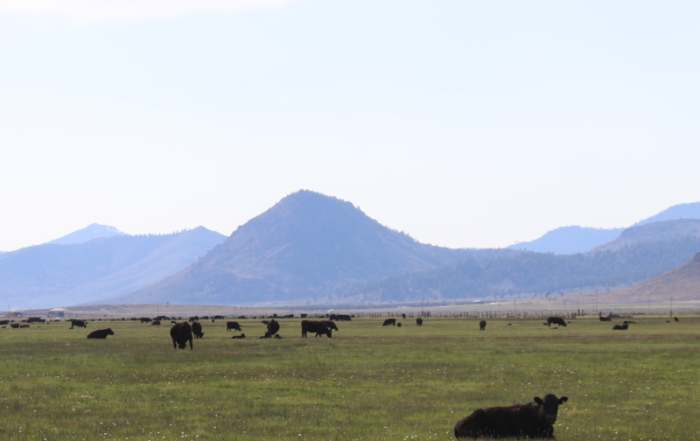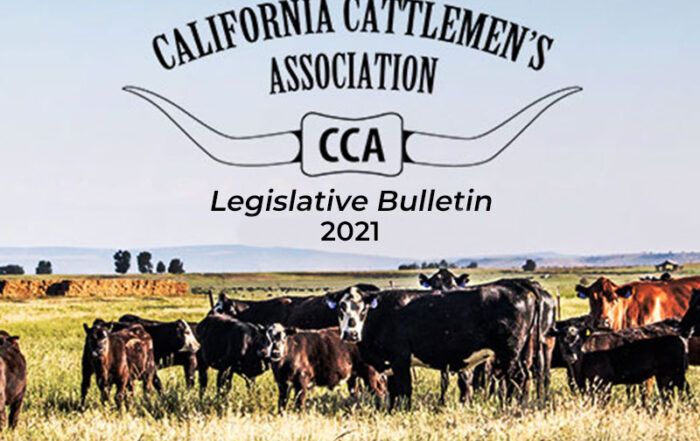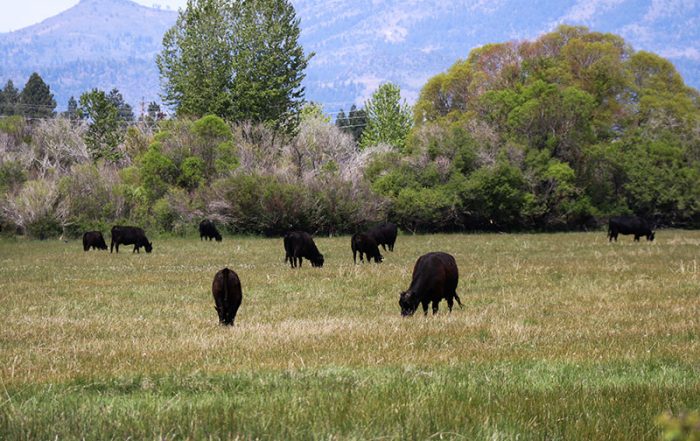COVID-19: Supply Chain Concerns Answered
In these times of uncertainty, we know there are many questions regarding COVID-19 and the beef supply chain. Below we have included recent updates and answers to questions you may be facing. Understanding everyone is affected by COVID-19 in a variety of ways, if there’s any information you need that is not included in this update or that you cannot find on our website please let us know.
Will the beef industry or California’s agricultural sector face any restrictions for working or producing food during the COVID-19 pandemic?
CCA staff and leadership has been in constant contact with the California Department of Food and Agriculture (CDFA) and the Governor’s office to ensure that all sectors of the livestock industry and beef production are considered “essential services,” ensuring that there will not be any restrictions or unnecessary hurdles in the way of providing beef to re-stock grocers’ meat cases.
CDFA has issued guidance that “The food supply makes up critical infrastructure from farm to table and includes assets, systems, networks, and functions that provide vital services to the nation. It is essential that federal government-defined critical infrastructure and supply chains are protected, and that all elements pertaining to the food supply remain operational, including a workforce that is vital to production of the food supply.”
CCA expects no restrictions upon the agricultural sector and food production. Should your operation confront any hurdles related to the COVID-19 outbreak, contact CCA staff immediately so that we can work with CDFA and the Governor’s office to immediately resolve any issues.
Are agricultural employees considered essential during this emergency?
Yes, the California State Public Health Officer has released a list of essential critical infrastructure workers confirming that “those employed in animal food, feed, and ingredient production” and other agricultural employees are considered essential and therefore exempt from the Governor’s stay-at-home order.
A full list from The California State Public Health Officer and Director of the California Department of Public Health of the “Essential Critical Infrastructure Workers” in the Food and Agriculture Sector can be found here (starting on page three).
What temporary changes have been made to processing H-2 visas to ensure labor shortages are not an issue during this time of uncertainty?
In response to growing fears about the shortage of farm labor approaching planting time for much of the west coast, and amid tightening restrictions due to COVID-19, last Thursday the U.S. State Department expanded the number of foreign agricultural workers whose visa applications can be processed without an in-person interview.
Read the full announcement here and learn more from the USDA on this announcement by clicking here. Additionally, the Department of Labor has issued two extensive FAQs on H2-A visas. The first FAQ factsheet released 3/20 can be found here. The second FAQ factsheet released 4/1 can be found here.
Will California livestock markets continue to remain open for business?
CCA has been in close contact with the Livestock Marketing Association and has received assurances that California livestock markets will remain open for business during the COVID-19 crisis. To prevent the transmission of the virus, however, markets are making changes to the way they do business to ensure proper social distancing.
Will packing plants continue to operate?
NCBA has created an extensive FAQ document, which includes the following answer regarding if packing plants are planning to close or reduce operations in light of the coronavirus:
Packing plants are working to ensure worker health and safety so that employees can continue to work, and plants can continue to operate. They are working on contingency plans in the event employees become ill. USDA remains committed to keeping the food supply chain safely operating. Inspectors and graders will continue to be in plants doing their job. In the event of sick or exposed employees the USDA has contingency plans in place to keep inspections going.
Will meat inspections continue during this pandemic?
USDA ensures that quality grading and inspection services will continue. On the Frequently Asked Questions page of USDA’s coronavirus webpage, the Department ensures the following:
“USDA’s Agricultural Marketing Service (AMS) continues to provide critical inspections and grading services. AMS is ensuring the health and safety of USDA employees while still providing the timely delivery of the services to maintain the movement of America’s food supply from farms to forks. If needed, AMS is prepared to remedy any possible disruptions in services.”
To learn more about USDA’s plans to ensure food safety during the pandemic, click here.
What is being done to ensure that all producer losses directly associated with COVID-19 are addressed by Congress?
Yesterday, a congressional letter signed by over 145 lawmakers was sent to USDA Secretary Sonny Perdue. The letter requested “swift assistance for cattle producers with the resources provided in the recently enacted Coronavirus Aid, Relief and Economic Security (CARES) Act to facilitate the stabilization of farm and ranch income to producers who are facing market volatility in the wake of the COVID-19 pandemic and economic fallout.” To read the full letter, click here.
Additionally, prior to President Trump signing an updated version of the CARES Act last Friday, NCBA and state affiliates including CCA had already provided guidance to USDA about how best to utilize the $9.5 billion for producer support appropriated to the agency under the Act.
Specifically, NCBA and CCA formally requested that USDA give particular consideration to impacted cattle producers, who are not eligible for traditional USDA and Small Business Administration safety net programs available to other commodity producers. Livestock groups are also asking that support payments be directed at producers with demonstrated loss and financial need attributable to the COVID-19 crisis (as opposed to a blanket payment equally apportioned among all producers).
To read the key provisions in the CARES Act for cattle producers, click here.
If my ranch or operation faces losses during this time what should I do?
CCA encourages all producers to document all losses associated with the COVID-19 crisis. Such information will be vital in ensuring that producers are compensated for losses associated with the pandemic.
Will the food supply chain be impacted by the closing of borders?
While some international borders have been closed (e.g. Canada/US, US/Mexico) and some states have acted to limit travel in-and-out of those states, essential services such as agricultural products are exempt and thus permitted to travel despite such restrictions
What temporary Hours of Service exemptions for livestock haulers have been provided by the Feds and Governor Newsom?
The Federal Motor Carrier Safety Administration (FMCSA) has issued an Expanded Emergency Declaration exempting livestock haulers from compliance with the federal Hours of Service rules that limit drive time. The declaration provides an Hours of Service exemption for all haulers “providing direct assistance in support of emergency relief efforts related to the COVID-19 outbreaks, including” food “for emergency restocking of distribution centers or stores” and “immediate precursor raw materials” necessary for the production of such food and groceries. The Office of the Secretary of Transportation interprets all livestock hauling to fit this exemption.
Hours of Service rest requirements remain in effect under the declaration, meaning that once a driver returns to his or her “normal reporting location,” that individual must still receive a minimum of 10 hours of off-duty rest.
Governor Gavin Newsom responded to the exemption by issuing an Executive Order likewise exempting haulers engaged in intrastate or interstate transportation from California’s Hours of Service regulations.
While Governor Newsom’s order does not explicitly reference livestock (or “precursor raw materials”), the order makes clear that it is intended to be consistent with FMCSA’s order and apply to all hauling “in support of emergency relief efforts,” including “food for emergency restocking of stores.”
The FMCSA exemption is in effect until April 12 (or until the COVID-19 national emergency is terminated, if it is terminated prior to April 12). The California exemption is in effect as long as the FMCSA exemption remains effective.
Though not required, CCA recommends that livestock haulers operating under these exemptions print out the FMCSA Expanded Emergency Declaration, available here, and Governor Newsom’s Executive Order, available here, and keep these documents in their cab. Other questions about this FMCSA Emergency Declaration can be answered by an FAQ document, by clicking here.
What other action has been taken to improve the food industry’s capacity to deliver products during this emergency?
A letter signed by dozens of agricultural associations and coalitions including NCBA, was sent to Governors and state officials asking states “to increase truck weights on all U.S. highways and Federal Interstate Highways in your state to a minimum of 88,000 pounds—while respecting bridge and posted seasonal or special road and/or local limitations.”
The letter states that “Establishing a minimum of 88,000 pounds ensures that a minimum harmonized weight exists across the country and further ensures that essential shipments adhering to this common increase will not be impeded at state lines.”
While many states have acted and increased truck weights, California has yet to do so. CCA will keep you informed of any related updates.
What temporary guidance exists for veterinarians working with producers at this time?
The Food and Drug Administration (FDA) announced in a release on March 24 that “it intends to temporarily not enforce certain requirements in order to allow veterinarians to better utilize telemedicine to address animal health needs during the pandemic.”
To help answer questions on the temporary guidance for veterinarians and producers, the American Association of Bovine Practitioners, National Milk Producers Federation and National Cattlemen’s Beef Association have created a factsheet. To access it, click here.
Rest assured that CCA and NCBA are making every effort to ensure the integrity of the beef supply chain; our organizations are identifying any obstacles to the supply chain well in advance, and have worked expeditiously to overcome any obstacles. Ranchers ought not be concerned about the beef supply chain. That said, should you encounter any hindrances, we encourage you to reach out to CCA or NCBA immediately so that we can work to correct the issue in a timely manner.
FOR MORE INFORMATION CONTACT:
Call (916) 444-0845 or
email CCA staff.
RECENT COVID-19 UPDATES
USDA Announces Resumption of CFAP Payments
USDA will resume issuing payments under CFAP early next month.
Legislative Bulletin: January 25, 2021
CCA's latest weekly e-newsletter is here.
Congressional COVID Relief Compromise, Omnibus Spending Package Includes CFAP Payments Among Other Provisions for Ranchers
Details for ranchers on the House's newly proposed funding package.




